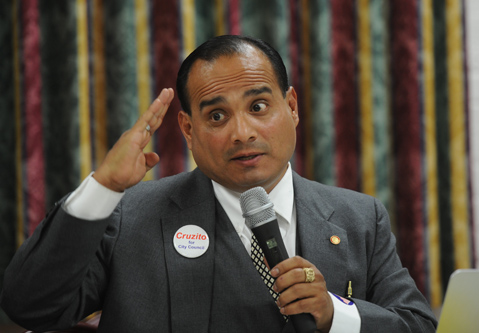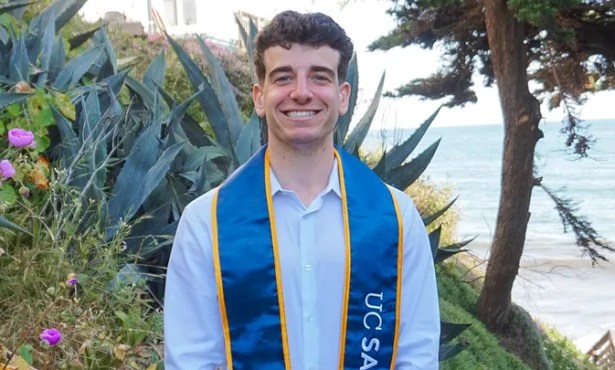The Strange and Mysterious Case of Cruzito Cruz
Lawyer Seeks to ‘Fire’ Lone Holdout in District Elections Settlement

Over the past ten years, Cruzito H. Cruz has emerged as a vocal and nearly ubiquitous champion of the underdog both as perennial city council candidate and visible community activist, relentlessly chastising City Hall for its “racially polarized” election results and demanding that district elections be instituted as a remedy.
But with City Hall now poised to capitulate to his demands to enact district elections, the normally loquacious Cruz — one of five plaintiffs to sue City Hall for violating the California Voting Rights Act — has gone mysteriously incommunicado, reportedly refusing to sign a settlement that would deliver what he’s long demanded.
More than that, Barry Cappello — the attorney representing Cruz and the four other plaintiffs — complained that Cruz has refused to even discuss the matter with him or any of his assistants. Because of this, Cappello filed legal papers with Judge Donna Geck seeking to be relieved of his responsibilities to represent Cruz as his counsel. Cappello contended his office had contacted Cruz via email, telephone, and text repeatedly to discuss the case, but with no response.
Cappello stated his office has sent 15 emails, and placed five phone calls to Cruz in both English and Spanish. The attorney stated he sent assistants to Cruz’s home. On February 11, Cappello’s assistant Jasper Ozbirn stated he contacted Cruz in person. “Mr. Cruz refused to discuss this matter whatsoever and got in his car and drove away while I was attempting to talk to him,” Ozbirn stated in a court declaration.
Early Thursday morning, Cappello met with Judge Geck and asked that she expedite the trial to determine whether he could discharge Cruz as a client. The Judge agreed to do so and scheduled the matter for next Thursday. Cruz was not present in the courtroom. But shortly after Cappello’s legal team — accompanied by at least two of Cruz’s fellow plaintiffs — left Geck’s courtroom, Cruz himself walked briskly by, carrying a large bundles of books under both arms.
Cappello addressed his client, saying, “Cruzito.” Cruz did not stop, did not acknowledge Cappello, and kept on walking. Likewise when this reporter sought to engage Cruz in conversation, Cruz kept walking and did not acknowledge anything had been said to him. When this reporter kept walking with Cruz, Cruz quickly pivoted, turned around, and entered the courtroom of Judge Geck. According to unconfirmed but widely circulating reports, the district elections dispute could have been settled as early as last Wednesday but for Cruz’s opposition.
On the campaign trail, Cruz always brought an element of theatrical flair to candidates’ forums, on occasion blowing a ceremonial conch and alternating fluidly between English, Spanish, and densely worded legalese in his remarks, while highlighting issues like racial profiling, gentrification, and the criminalization of Latino youth. Cruz was seen more as a symbolic candidate seeking to raise issues in campaign forums, rather than a serious contender. He never sought, for example, to raise campaign cash.
Relations between Cruz and his four fellow plaintiffs were reportedly strained and difficult. Part of that tension, they said, was a function of age, experience, and personality. But from the start, it was also clear that Cruz and his fellow plaintiffs held irreconcilable differences whether to settle the case if possible. The other four favored settlement for a host of reasons. Cruz was adamantly opposed, insisting the matter go to trial. In comments to The Independent when the lawsuit was still in its inception, Cruz had spoken resentfully that individuals who had not been advocating district elections in recent years — like Cappello — would command center stage on an issue he’d championed.
Even as a settlement came within reach, Cruz didn’t change his mind. Many of his fellow plaintiffs expressed befuddlement as to his position. One speculated that Cruz had long looked forward to having his day in court with City Hall and couldn’t let that go. Whatever the reason, without Cruz’s signature, any deal with the city became problematic. For City Hall to settle with one plaintiff still holding out would be the legal equivalent of putting out a fire while leaving an ember burning. Adding to the political heartburn surrounding the issue, there is little support anywhere within City Hall for district elections, and much angst that so momentous a political change would be brought about by legal action as opposed to a vote of the people.
Cappello’s motion to discharge Cruz is seen as part of a broader legal strategy undertaken by both sides to reach a settlement with only four of the plaintiffs’ consent. Neither Cappello nor City Attorney Ariel Calonne was willing to discuss how a settlement could be bridged with Cruz not on board. Nor would they discuss what legal status Cruz would retain should Judge Geck agree to relieve Cappello of his responsibilities to Cruz.
As a practical matter, the lawsuit had legs chiefly because Cappello, an accomplished litigator and former City Attorney had agreed to take the case on contingency. The understanding was that his clients would not be charged his customary $950-an-hour fee, but they would pay for expert witnesses and other expenses. The deal was always that Cappello would be paid by City Hall. The California Voting Rights Act awards attorneys’ fees to the prevailing party. To date, no city sued for violating this law has successfully prevailed in court. Most choose to settle, motivated in large measure by the stiff legal costs they would otherwise incur.
In this case, Cappello hired a demographic expert to comb over Santa Barbara election results to determine the extent to which there’s a significant difference in the political preferences of Latino voters and voters at large. That, under the terms of California Voting Rights Act, is what defines racial polarization. City Attorney Ariel Calonne has also hired an expert.
While none of their studies have been made public, City Hall’s eagerness to settle makes a compelling case, however inferentially, that racial polarization exists. Since 2000, only one Latino candidate has been elected to the City Council and two other non-whites. Latinos currently comprise 38 percent of the city’s population and 24 percent of its electorate.
For Cappello and Calonne, a key question is what legal standing Cruz can still command in taking the complaint to trial. Cruz is not an attorney, but has spent many hours in the courthouse law library, digesting legal code sufficiently well that during campaign forums he can — and does — quote them chapter and verse in great detail. In addition, Cruz has represented himself in an elections dispute with City Hall in the past and prevailed. In that case, city elections clerks determined that Cruz had not submitted the requisite number of valid signatures of registered voters to qualify for the ballot. In making that determination, officials ruled several of the signatures Cruz submitted were technically deficient. Cruz challenged that and a judge found enough of the contested signatures were, in fact, valid. Cruz was allowed to run.
Regardless of any legal standing Cruz might maintain, it’s hard to see what kind of case he could possibly make if City Hall does adopt district elections as indicated. District elections are the one remedy absolutely recognized by the courts under the terms of the California Voting Rights Act for racially polarized voting. Once district elections are agreed to, City Hall would appear to be inoculated against further legal challenge. In that scenario, there would be no prospect of attorneys’ fees being awarded to any prevailing party. Absent such an inducement, it is unlikely any attorney would take the case on contingency.
The first public workshop to discuss the advent of district elections — and begin the public process to determine the geographic boundaries of the six new districts — is scheduled for February 28.



